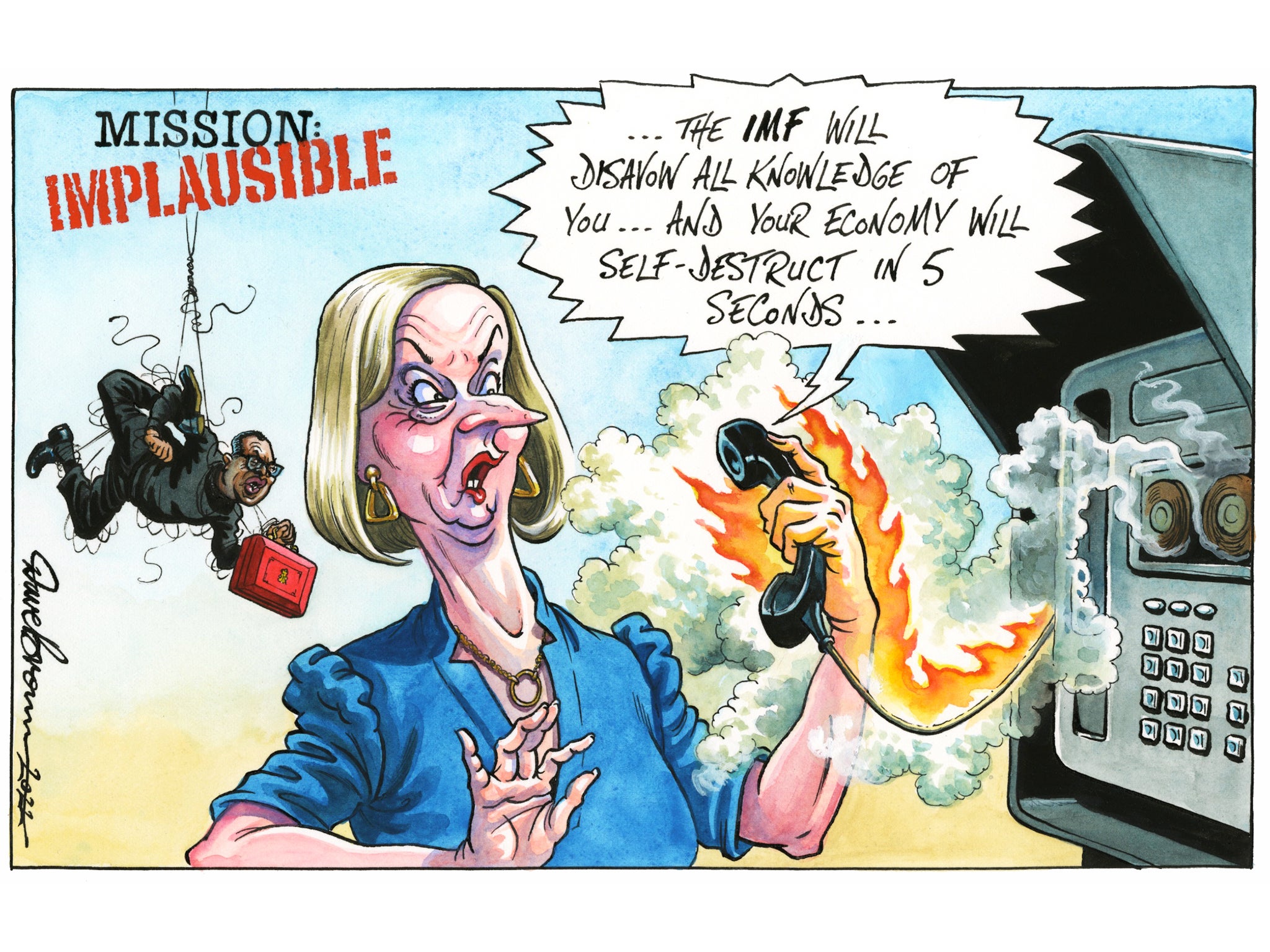It gets worse. Though as yet undeclared and unacknowledged by ministers or the Bank of England, the United Kingdom is going through a sovereign debt crisis of the kind experienced by the likes of Greece, Portugal and Italy around a decade ago.
The collapsing value of British government debt, gilts, is affecting the banks and other financial institutions that hold these rapidly devaluing assets. The Bank of England has had to step in, buy the assets and generally ensure the banks can still lend into the economy and remain solvent. Rarely can an advanced economy have had to pay such a heavy price for the arrogance of one man – but Kwasi Kwarteng’s refusal to listen to civil service advice or even cost his own policies has resulted in a crisis and talk of an IMF rescue.
And it is not even one week since Mr Kwarteng, presumably with the full authority of Liz Truss, tied sterling to a boulder, chucked it in a lake and declared “a new era for Britain”. Well, he was right about the last bit. “Mini-Budget” seems an inadequate word to attach to the macro-crisis he has triggered with his reckless unfunded tax cuts.
As some years ago, with the unfortunately named “PIGS” – Portugal, Italy, Greece, Spain – there is a crisis of confidence in the ability of the authorities to manage the economy and maintain the essential state services and banking activity on a sustainable basis. As with those nations, there is an increasing reluctance by investors to lend – and an increasing suspicion that the International Monetary Fund will have to intervene to lend funds when normal market sources of funding run out. It would be somewhat ironic if, after all that has happened, the stronger nations of the European Union – via the IMF – had to bail the UK out.
The underlying reasons for the incipient UK sovereign debt crisis are quite large enough to be perfectly apparent: the net costs of rescuing the banks during the financial crisis of 2008-09 and the direct and indirect costs of Covid. Now, the war in Ukraine and the subsequent energy crisis have loaded yet more debt onto a sluggishly growing economy – another long-term weakness.
The chancellor, Kwasi Kwarteng, unveiled the Conservative government’s latest answer to the modern British disease of low growth and high indebtedness – and investors worldwide found it worse than unconvincing.
The lack of institutional scrutiny was one weakness; the fact that fiscal policy is running contrary to monetary policy was another reason to exit sterling-denominated assets. Hence the run on the pound and the sell-off of UK gilts. The Bank of England has been forced to reverse policy, lenders have withdrawn mortgage offers – and a housing crash seems imminent.
Contrary to some of the calls for Thatcherite cosplay, this is not a time for the authorities to “hold their nerve”. As with the global financial crisis, the Brexit referendum shock, and the pandemic, the best approach to a sudden shock (even one self-inflicted), is to act quickly and boldly. Sometimes, an orderly approach to policymaking can merely create more disorder in the markets.
First, Mr Kwarteng should appear at an emergency session of the Commons – tomorrow would not be too soon – and announce his broad policy to fund his tax cuts and bring borrowing under control. Any disruption to the Conservative conference is of no consequence in such circumstances.
The “fiscal event” scheduled for 23 November needs to take place now. Unfortunately, it may mean some compensatory tax rises in appropriate areas. It will mean cuts to public spending – and the sacrifice of much-cherished aims such as boosting defence spending and the various investment zones and freeports (which may not actually increase growth overall).
To keep up to speed with all the latest opinions and comment sign up to our free weekly Voices Dispatches newsletter by clicking here
Second, and in the context of the new mini-Budget, the Bank of England needs to hold an emergency meeting of the Monetary Policy Committee and ramp interest rates by an amount sufficient to persuade markets that it means business on inflation. Somehow it will have to do so at the same time as protecting pension funds and institutions from the consequences of their devalued government debt.
If Liz Truss and Andrew Bailey, governor of the Bank of England, do not act immediately to restore confidence, they risk further damage to the economy and an even bigger bill for fixing Mr Kwarteng’s disastrous misjudgements. Ideally, Ms Truss would appoint a new chancellor – though that is as politically unrealistic as expecting her to cancel the tax cuts for the rich.
If Ms Truss doesn’t act decisively now to “deliver” financial stability, then she will be soon overwhelmed by events and forced to ask for a stand-by facility from the IMF – a humiliating bailout that will damage her party for years to come, and push the cost of borrowing for the UK permanently higher.
We have not heard much from the prime minister recently. She needs to act.







Join our commenting forum
Join thought-provoking conversations, follow other Independent readers and see their replies
Comments